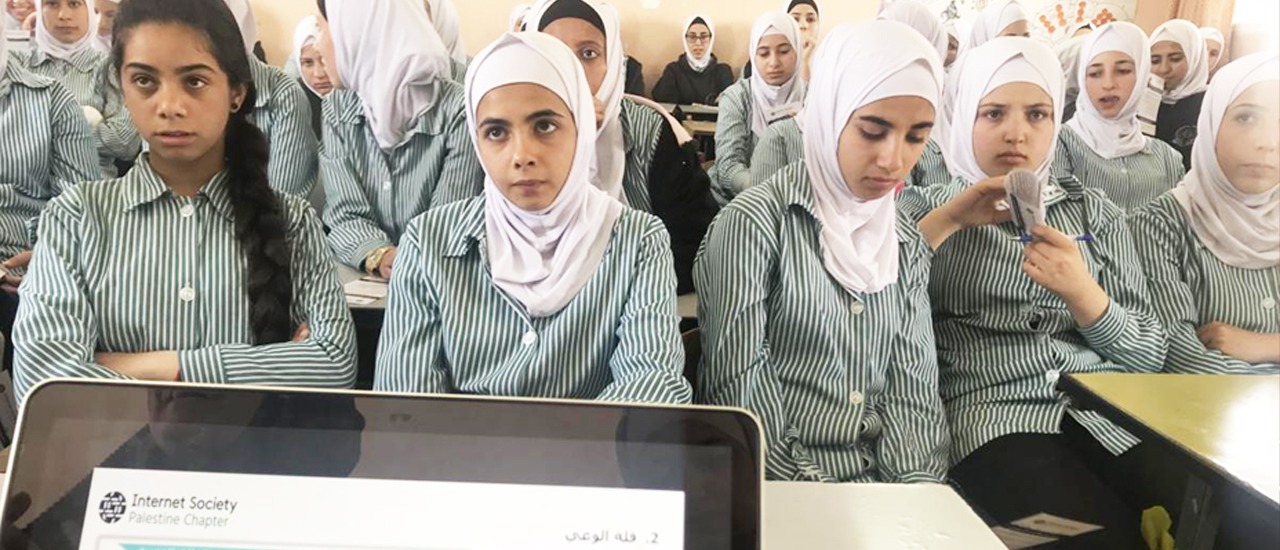Cyber-bullying is a growing phenomenon amongst preteens. Studies have established that nearly 43% of children are victims of cyberbullying and girls are twice as likely to be targeted. Students who experienced cyber attacks suffer drops in school grades and have more suicidal thoughts than those who had never dealt with such forms of peer aggression. A link between cyber harassment victimization and noncompletion of school has been demonstrated resulting in increased risk of poor education and substance abuse in adulthood.
Sadly, the majority of the victims do not report the incidents to adults or authorities due to fear of negative effects and social scandal. The tacit support given to the bullying perpetrators through silence contributes to the escalation of victimization. Banning technology is not the answer. Cyberbullying prevention in schools is crucial to defend students from this new face of violence.
The Internet Society Palestine Chapter is conducting a campaign to raise awareness about the dangers of electronic blackmail and cyber harassment. The project, funded by the Internet Society Beyond the Net, has already reached more than 2250 schoolgirls in 25 Palestinian schools in phase I of the project.
 Ahmad Alsadeh, assistant professor at Birzeit University and project manager, explains what motivated the Palestine Chapter to start this project called Online Sexual Harassment-and-Blackmail Awareness for Palestinian Schoolgirls (iSHA-PS): “Young Palestinian girls resent the lack of technical and cultural knowledge to deal with blackmail and cyber harassment cases, especially girls who live in the countryside, where talking about this problem is a social taboo. This rule of silence is often leading them to be trapped in extortion. Our project is targeting 15-16 years-old-schoolgirls and aims to reduce the risks they are facing online by building their capacity in dealing with such cases.”
Ahmad Alsadeh, assistant professor at Birzeit University and project manager, explains what motivated the Palestine Chapter to start this project called Online Sexual Harassment-and-Blackmail Awareness for Palestinian Schoolgirls (iSHA-PS): “Young Palestinian girls resent the lack of technical and cultural knowledge to deal with blackmail and cyber harassment cases, especially girls who live in the countryside, where talking about this problem is a social taboo. This rule of silence is often leading them to be trapped in extortion. Our project is targeting 15-16 years-old-schoolgirls and aims to reduce the risks they are facing online by building their capacity in dealing with such cases.”
What is the cyberbullying background in your country?
“The phenomenon of blackmail and sexual harassment online has increased as a result of the spread of the Internet, especially on social media. The Palestinian justice authority receives dozens of complaints on daily basis, and these complaints are just a small percentage of the real number of cases. Most of the time, young girls decide not to report these crimes over fear of losing reputation.
Last year, Palestinian media reported the tragic stories of two girls who paid a $100,000 and $50,000 ransom to avoid embarrassing photos to be published online by a blackmailer. When girls are unable to pay the ransom they are forced to steal the money from their parents. Sometimes the blackmail victims tend to commit suicide because they can’t afford a ransom and they are afraid of honor-based conflicts.
What are your first steps?
After recruiting volunteers we were finally able to create our team and chose the project manager. We held a meeting and scheduled an effective plan to achieve the project’s goals that includes: Internet training, workshops in schools, the distribution of Internet Safety leaflets and the creation of a media campaign to raise awareness over the country.
What are the long term benefits of this project?
The project will run in Palestinian schools for 12 months covering two academic semesters. Training will be conducted by volunteering university female students. ISOC Palestine Chapter will continue the coordination with Palestinian Ministry of Education to enable the team to work in public schools for the second phase of the project, which will target another 25 Palestinian girls schools and reach to more than 2000 schoolgirls. This is a great opportunity to create a lasting partnership with public institution in order to continue running our program in schools for the upcoming years.
Related articles:
“Internet Chalao, Patriarchy Dabao. Leveling up Pakistani women”
“Digital abuse against women. Nighat’s fight in Pakistan”
Do you have a great idea to make your community better via the Internet? Apply for a Beyond the Net grant, which funds projects up to $30,000 USD, and follow Beyond the Net on Twitter!

